World War II in Photographs
Подождите немного. Документ загружается.

1945
groups of bombers and their fighter escorts were operating from
the island.
In Burma, meanwhile, 14th Army's offensive gained
momentum following its crossing of the Chindwin in December
1944. In February and March 1945 Slim fought the brilliantly
staged battle of Mandalay-Meiktila, first feinting towards
Mandalay and then hooking round the Japanese flank and across
the Irrawaddy to take the communication centre of Meiktila. The
new commander of Burma Area Army (his predecessor had been
dismissed after Imphal-Kohima), Lieutenant General Kimura
Hyotaro, counterattacked quickly, but was unable to shake Slim's
grip. Mandalay itself was taken after fierce fighting of great
symbolic importance, for it was said that "who rules Mandalay
rules Burma." Slim paused briefly at Pyawbwe, but the road to
Rangoon lay open, and his men hustled on down it. It was the
apotheosis of the old British Indian army, men of twenty races, a
dozen religions and a score of languages, surely never more effective
at any time in its long history. The Burmese capital duly fell to an
amphibious attack, Operation Dracula, on May 3.
The capture of Okinawa had cost the Americans 7,613 killed
and 31,807 wounded, and emphasized just how costly an assault on
the Japanese home islands was likely to be. This was at least part of
the reason why President Harry S. Truman, who succeeded
Roosevelt when the latter died suddenly on April 12, used the first
atomic weapons against Japan, and while members of postwar
generations harbour doubts about the morality of this action, there
were far fewer concerns at the time, not least amongst the soldiers,
sailors and airmen who would have risked their lives in the assault
on Japan. But it is also clear that using the bomb against the
Japanese was designed to demonstrate its effectiveness to the
Russians. The Allied conference at Yalta in February 1945 had
focused on the organization of the postwar world, and it was one of
the conflict's many ironies that the Poles who had fought so
gallantly in Italy, France, Poland and Germany were to find that the
postwar borders of their country were to be moved westwards,
leaving the eastern part of Poland in Russian hands while gains to
the west were made at German expense: the new frontier was to run
along the rivers Oder and Neisse. In July and August the last
wartime conference was held in Potsdam, and it was there that
Truman told Stalin of the atomic bomb's existence.
By 1920 it was believed that a supremely powerful weapon
might be created by the fission of heavy nuclei or the fusion of light
ones, and by 1940 German Jewish physicists working in England
suggested that a tiny amount of Uranium 235 could form the basis
for a powerful bomb. British-based scientists were shifted to the
American research team, the "Manhattan Project", in 1942, and
the first nuclear explosion, Trinity, took place at Alamagordo in
New Mexico on 16 July 1945. News of the project's success induced
Truman, as Churchill put it, to stand up to the Russians "in a most
emphatic and decisive manner." Two bombs were dropped on
Hiroshima and Nagasaki in early August, and assurances that the
doctrine of unconditional surrender would be modified so as to
enable the emperor to remain on his throne induced the Japanese to
surrender on August 14. The use of atomic weapons not only helped
end the war, but cast a long and enduring shadow over the postwar
world. The alliance that had won the war broke down, all too
swiftly, as the iron curtain described by Churchill in 1946 descended
across a scarred Europe.
One of the most striking effects of the postwar division of
the world into two rival power-blocs was to make balanced
appreciation of the Second World War almost impossible, as
Anglo-American historians generally failed to do full justice to
Russian achievements in the east, while the Russians, for their part,
did not acknowledge the importance of the Anglo-American contri-
bution. As we enter the Twenty-First Century at least that
imbalance is corrected, and the Second World War stands clearly for
what it was: the most momentous event in the whole of human
history, in which a great alliance (with its own huge flaws, contra-
dictions and inconsistencies) brought down a regime of
unprecedented vileness. It is a tragedy that, like their fathers before
them who had endured another great war, the war's combatants,
and the civilians who supported them, did not quite get the world to
which they were entitled: yet this should overshadow neither their
endeavour nor their sacrifice.
361
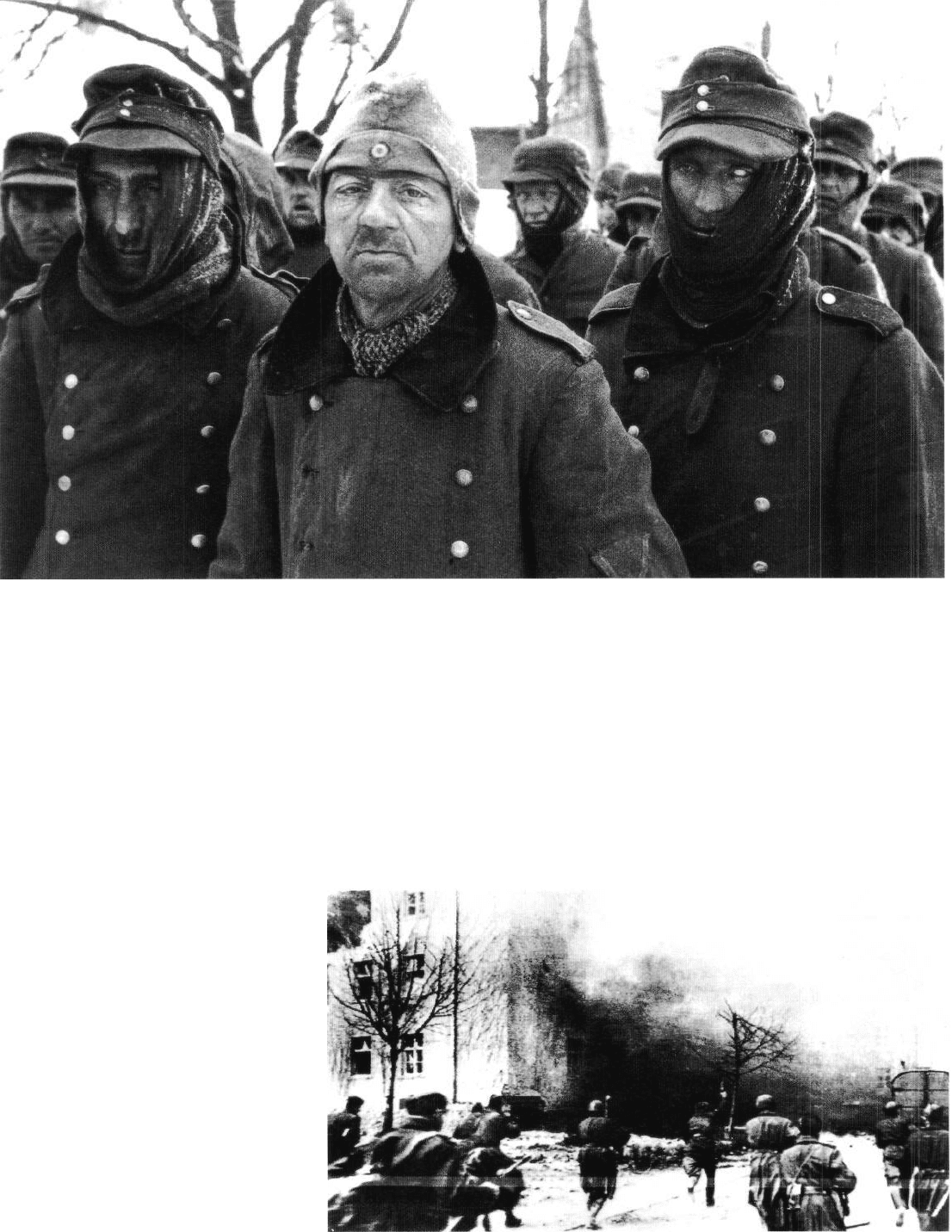
SOVIET ADVANCE INTO GERMANY
On January 12, the Red Army began the Vistula-Oder operation,
and by February 3, it was on the Oder, within striking distance of
Berlin. While the Russians paused, consolidating in East and West
Prussia, Hitler launched the 6th SS Panzer Army, redeployed from
the west, in a vain offensive in Hungary. The Russians grabbed a
bridgehead over the Oder in February, and on April 16, they began
the Berlin operation, with Zhukov's 1 st Byelorussian Front vying
with Koniev's 1st Ukrainian Front for the honour of capturing the
capital. After a destructive battle Berlin surrendered on May 2.
ABOVE
Hitler used the very old and the
very young to defend the Reich: these
prisoners were taken in Silesia in February.
RIGHT
Königsberg, capital of East Prussia,
was taken by the Russians in early
April. It became the Russian city
of Kaliningrad when national
boundaries were realigned after the war.
362
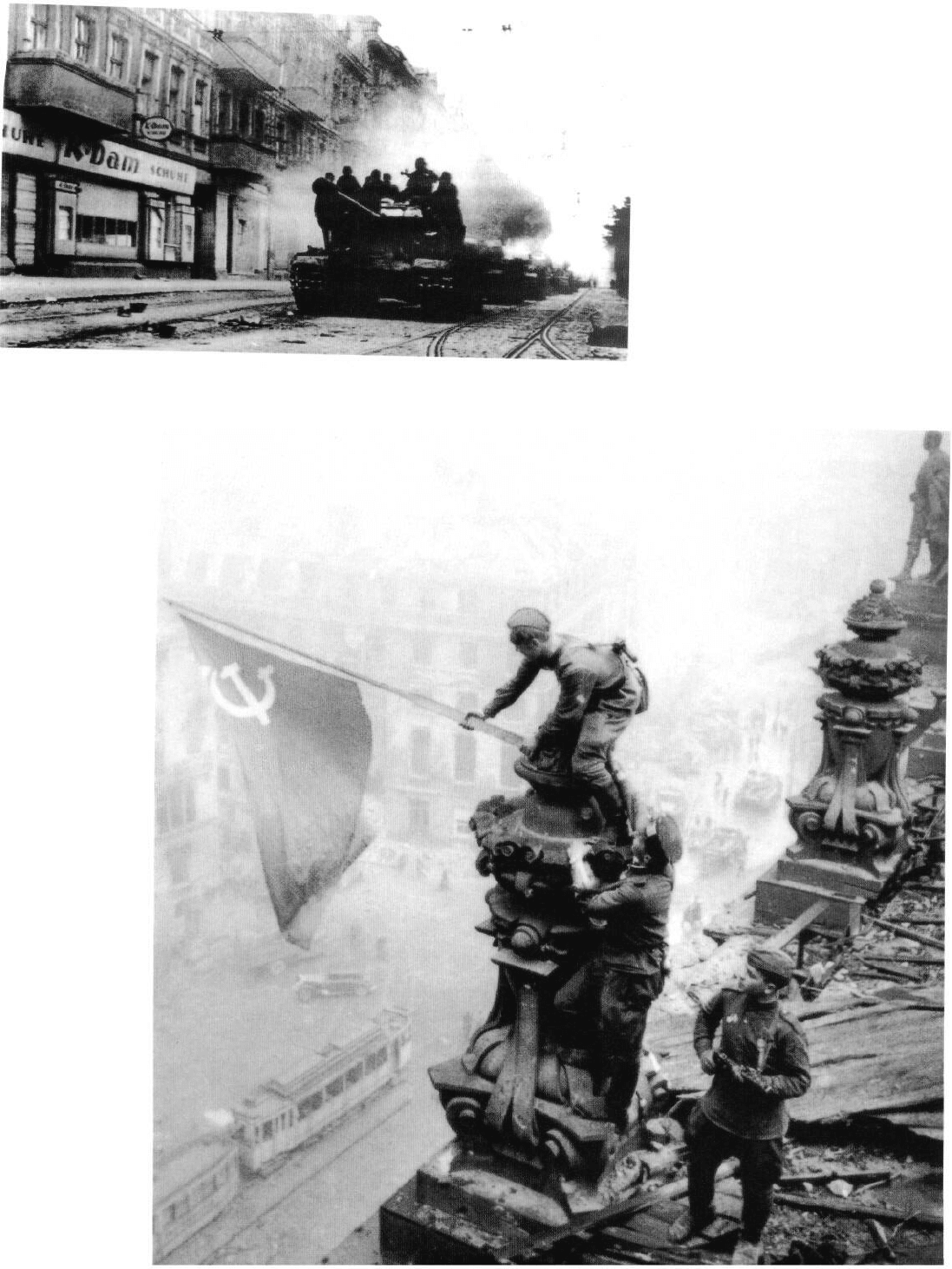
1945
LEFT
A column of Russian tanks
rolls down a Berlin street.
BELOW
In one of the war's classic photographs the
Russian flag is raised over the Reichstag
in Berlin, May 2. Some of the shots in
the sequence needed subtle retouching to
conceal the fact that the flag-raising sergeant
had an armful of "liberated" watches.
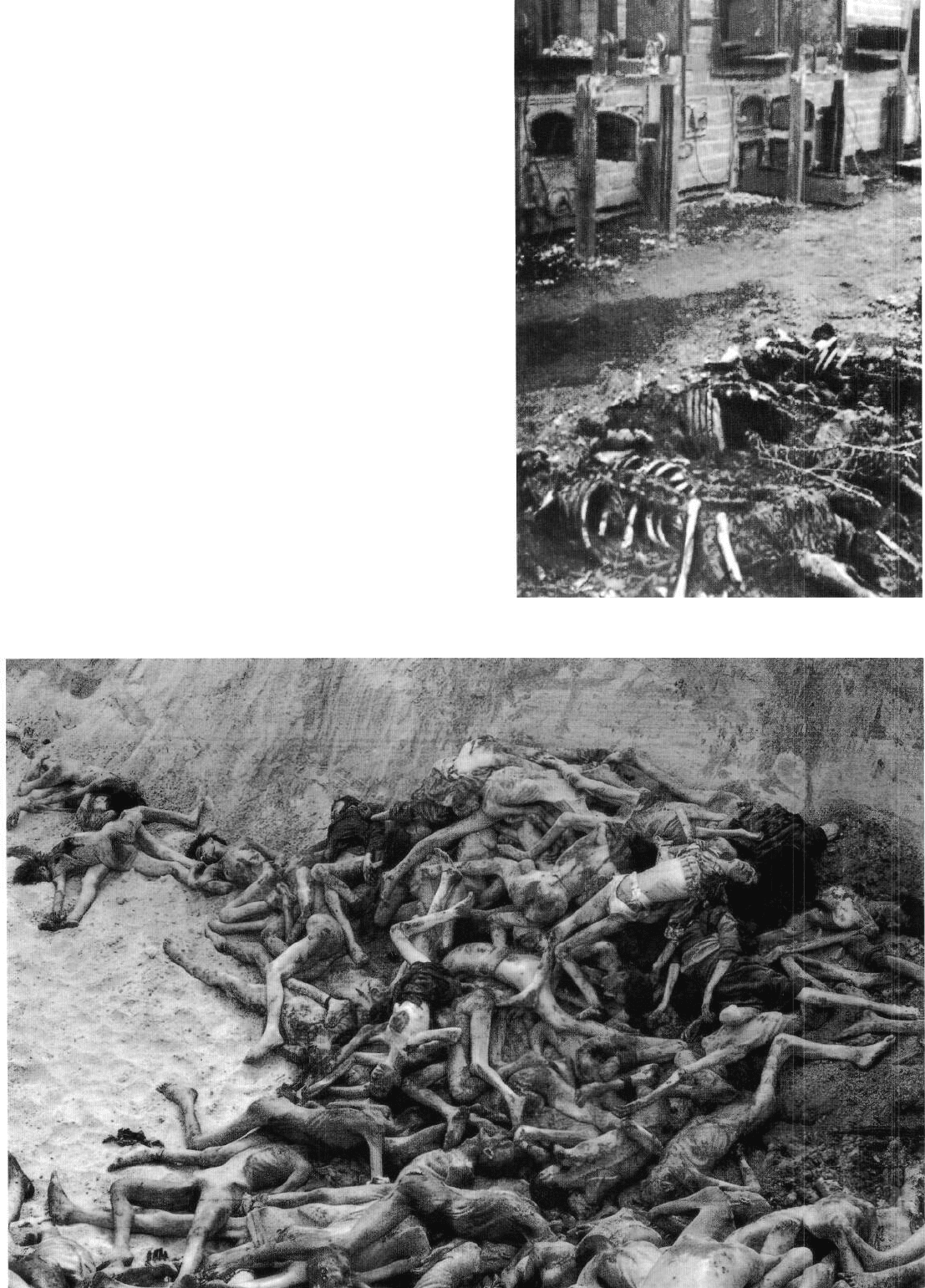
DISCOVERY OF THE
CONCENTRATION CAMPS
As the Allies advanced they found horrifying evidence of the fate
of the Jews, gypsies, homosexuals and enemies of the Nazi regime.
Death camps like Auschwitz-Birkenau were partially destroyed
before the Allied troops reached them, but concentration camps
such as Bergen-Belsen and Dachau were horrifying enough.
It is impossible to be sure of the real toll of those killed in
death camps, concentration camps, ghettos, labour camps
or forced marches, but it included some six million European
Jews and at least 31/2 million Soviet prisoners of war.
RIGHT
Crematoria in the camp at
Lublin-Majdanek, reached
the Red Army in July 1944.
BELOW
A communal grave at Bergen-Belsen,
a concentration camp liberated by
the British in April 1945. It then
contained 10,000 unburied dead and mass
graves with 40,000 bodies. Many of the
60,000 survivors died soon after liberation.
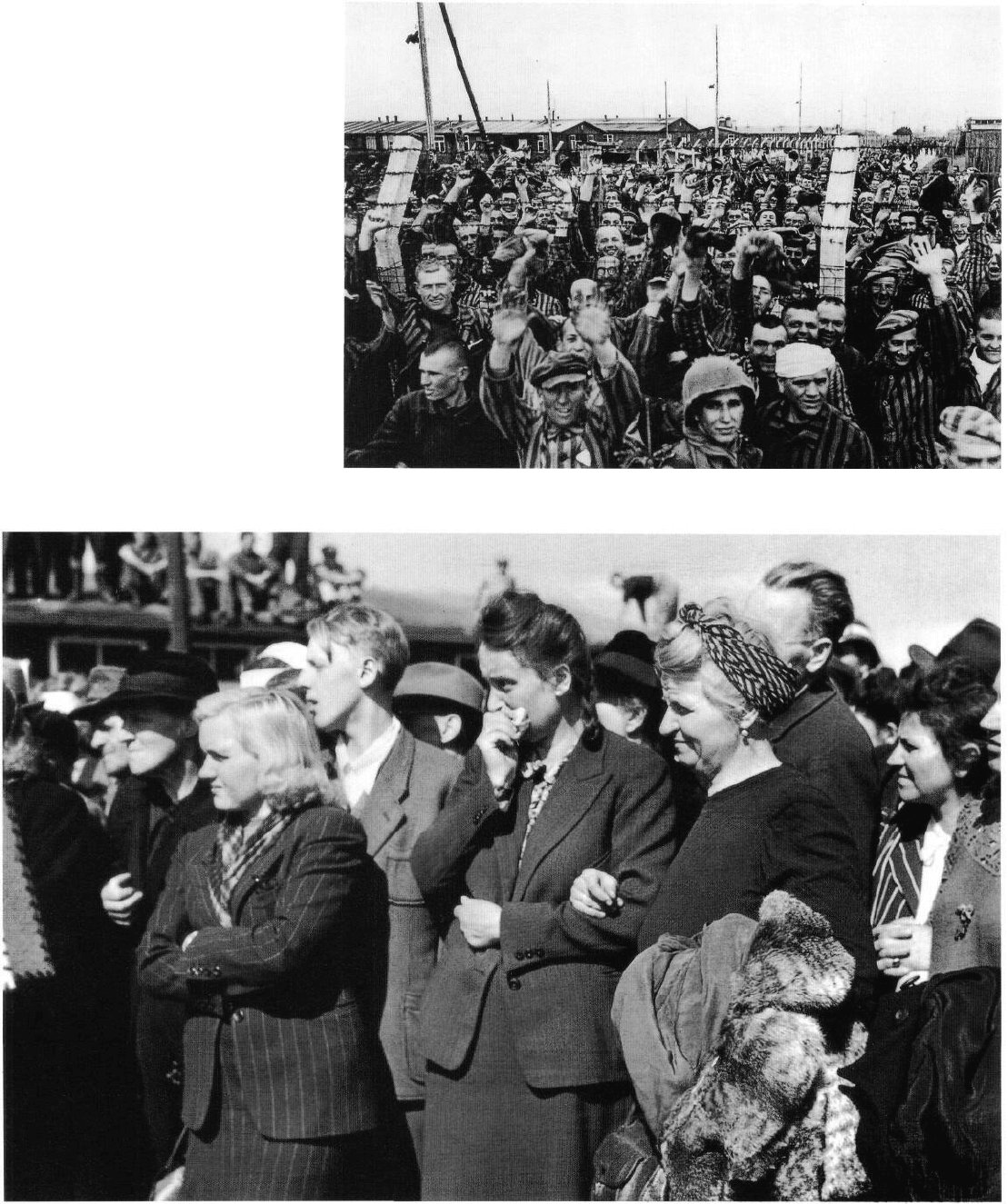
1945
RIGHT
Survivors of the concentration camp
at Dachau celebrate their release
by the US 45th Infantry Division.
BELOW
The camp at Buchenwald was liberated
by the Americans on April 13. Citizens
form the nearby town of Weimar
were marched round the camp by
American military policemen to ensure
that its sights were not forgotten.
365
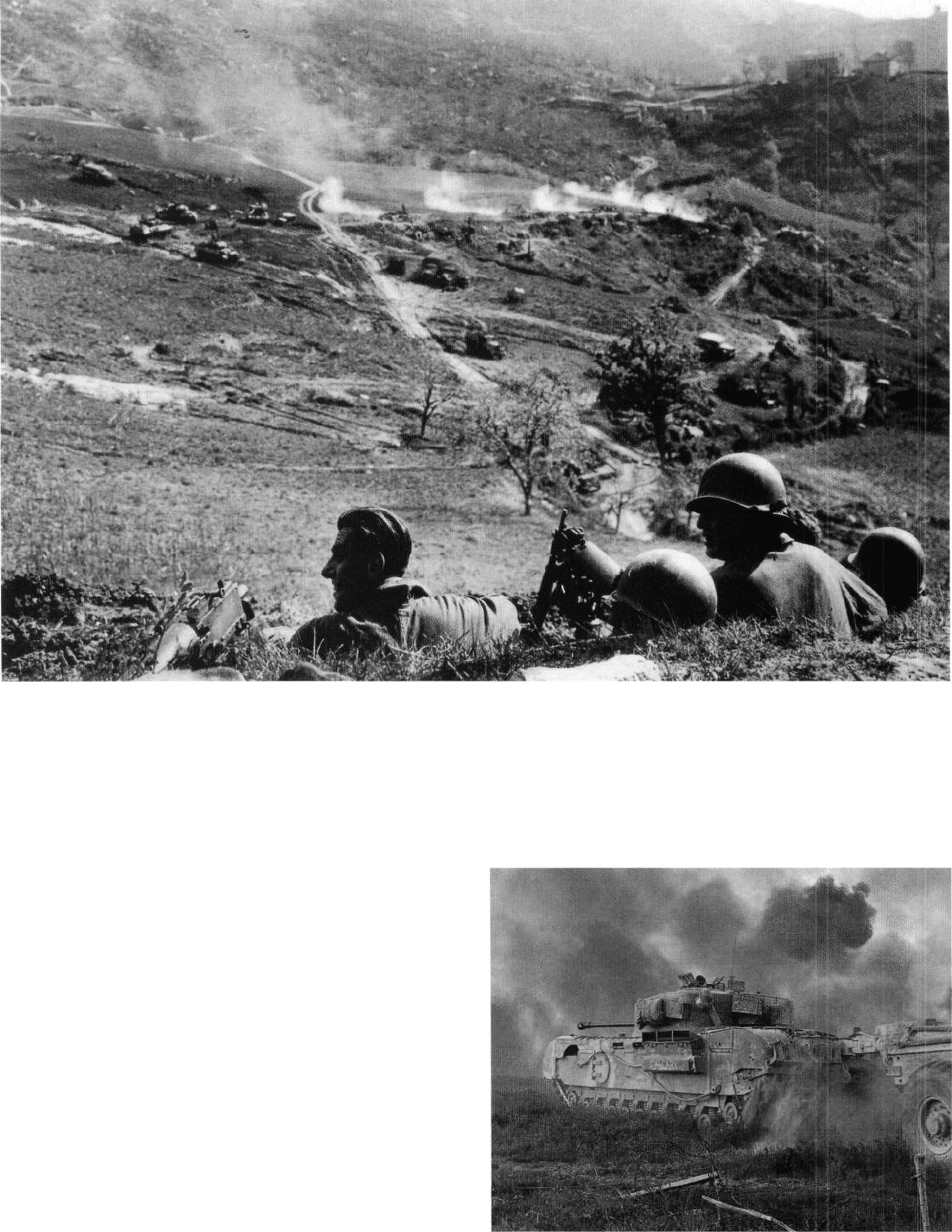
ITALY
Filthy weather, a stout defence and the diversion of troops to
Southern France prevented the Allies form completing the
conquest of Italy in 1944. The Allies began their main attack
in April, crossing the River Po, and taking Bologna on the 21st
and Verona on the 26th. A formal surrender took place on May 2.
Mussolini, rescued from arrest by the Germans on September 12,
1943 and placed at the head of the puppet Italian Social
Republic, was captured and shot by partisans on April 28.
RIGHT
8th Army attacked the River Senio on April
9, on the heels of a ferocious bombardment
whose smoke shrouds the sky behind this
tank. Its name suggests a Canadian origin,
but the 1st Canadian Corps had left Italy
for north-west Europe in March 1945.
ABOVE
US machine-gunners watch tanks
and artillery firing on German positions
around Monte Valbura, April 17.
366
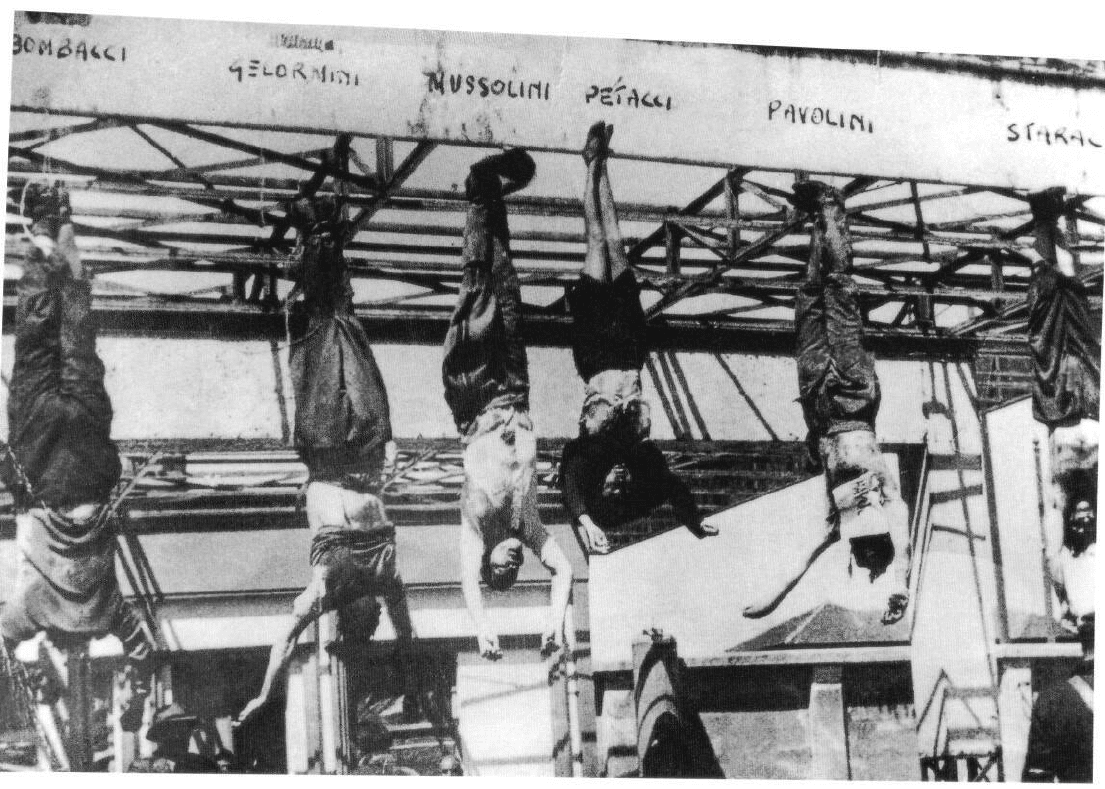
1945
ABOVF
The bodies of Mussolini and several
of his associates are exhibited in
Milan's Piazza Loreto. His mistress,
Clara Petacci, hangs alongside him.
367
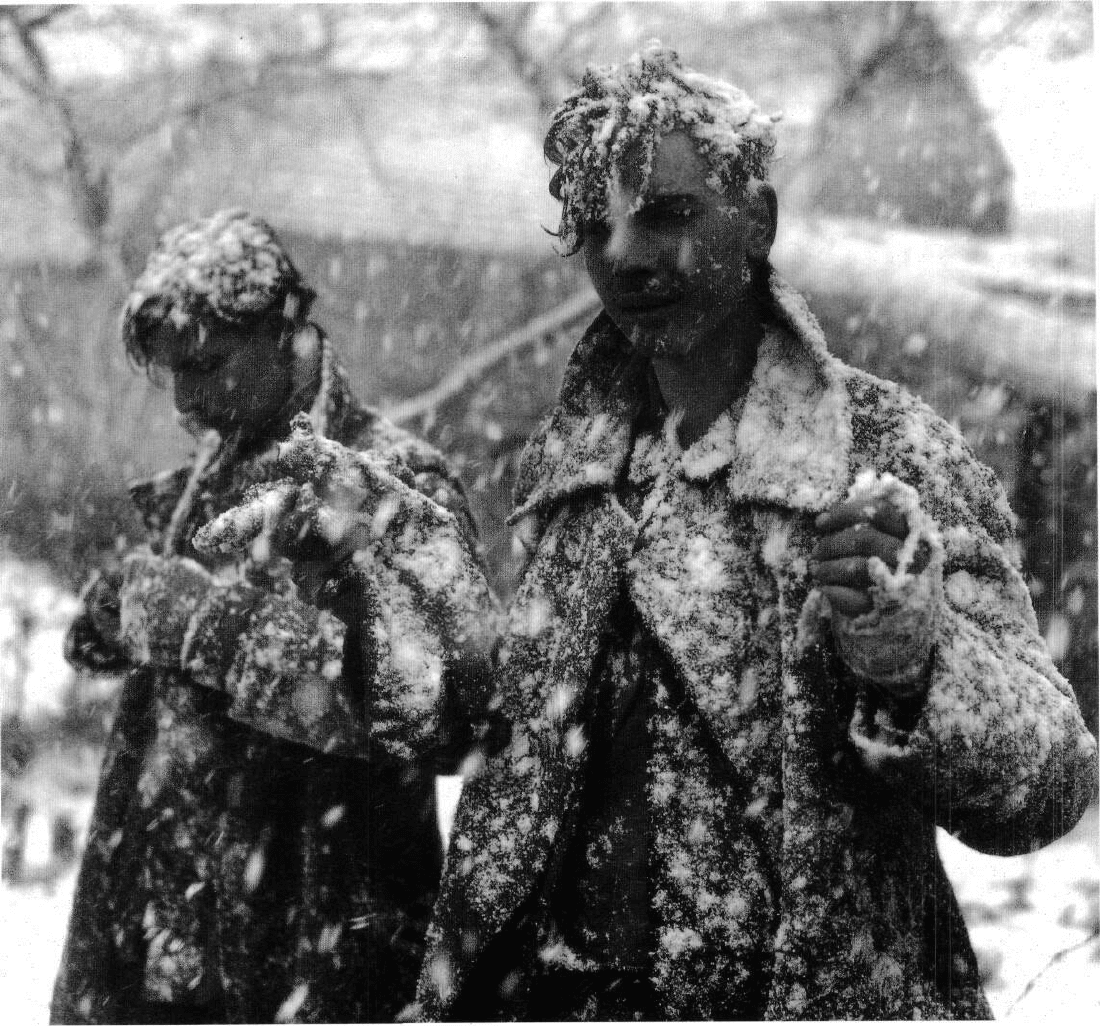
1945
ABOVE
Two young Germans captured by 52nd
(Lowland) Division at Hongen on January 20.
ALLIED ADVANCE INTO GERMANY
There was more bitter fighting as Montgomery cleared the
Reichswald and the Hochwald to close up on the Rhine in late
March. Further south, Hodges' 1st Army captured the bridge
at Remagen, between Bonn and Cologne, intact on March 7,
and on March 22 Patton's 3rd Army crossed the Rhine south
of Mainz. Montgomery staged his own crossing, on a grand scale,
on the night of 23-4 March. The two American armies closed round
the Ruhr pocket, taking over 400,000 prisoners, in early April.
368
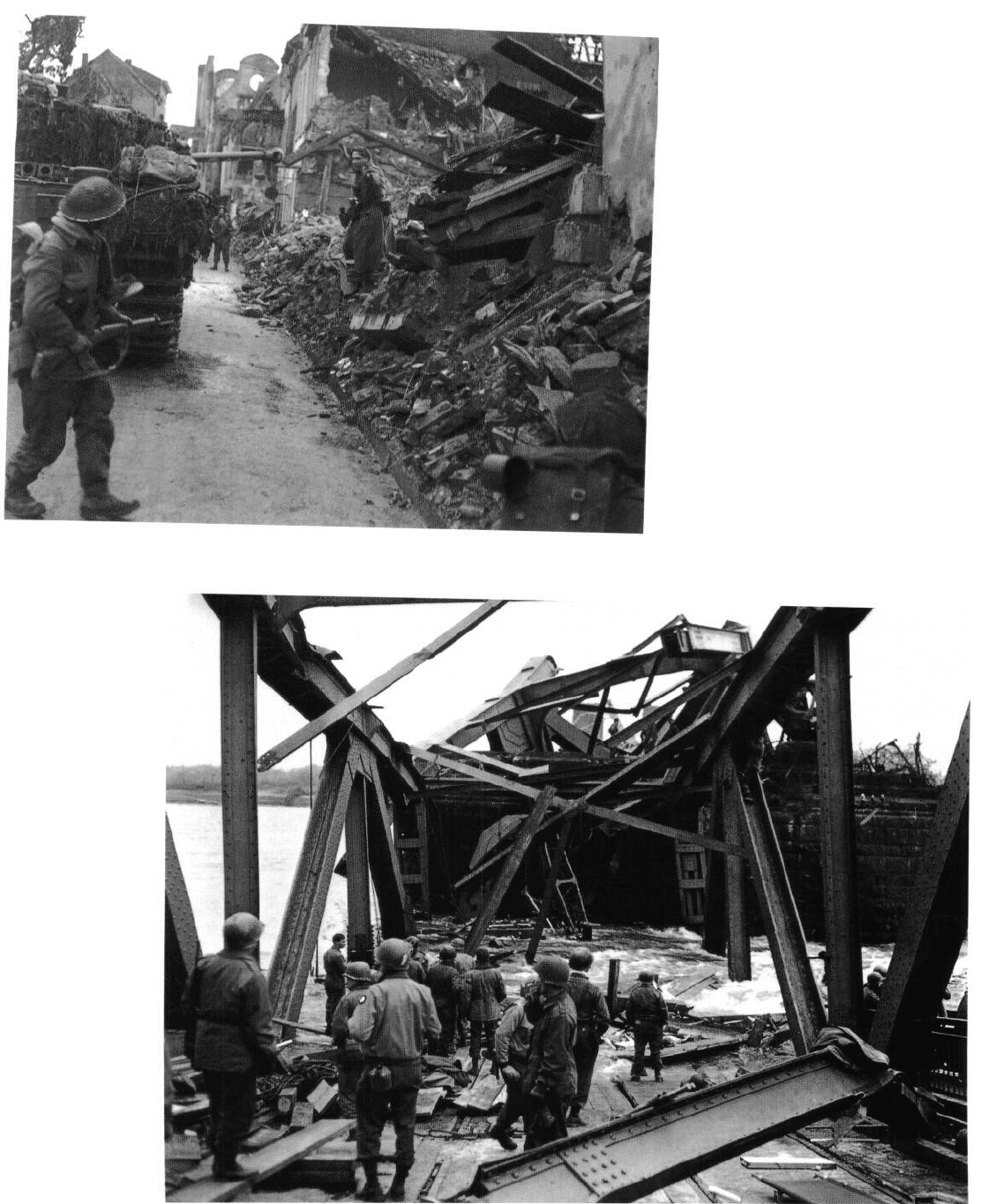
1945
LEFT
Overwhelming force: a German
emerges from the rubble of Cleves,
north-east of the Reichswald.
BELOW
The Ludendorff railway bridge over the
Rhine at Remagen was captured on
March 7, and five German officers were
summarily shot for allowing it to be taken
intact. This photograph show the bridge
after it collapsed on the afternoon of March
17, after five US divisions had crossed.
369
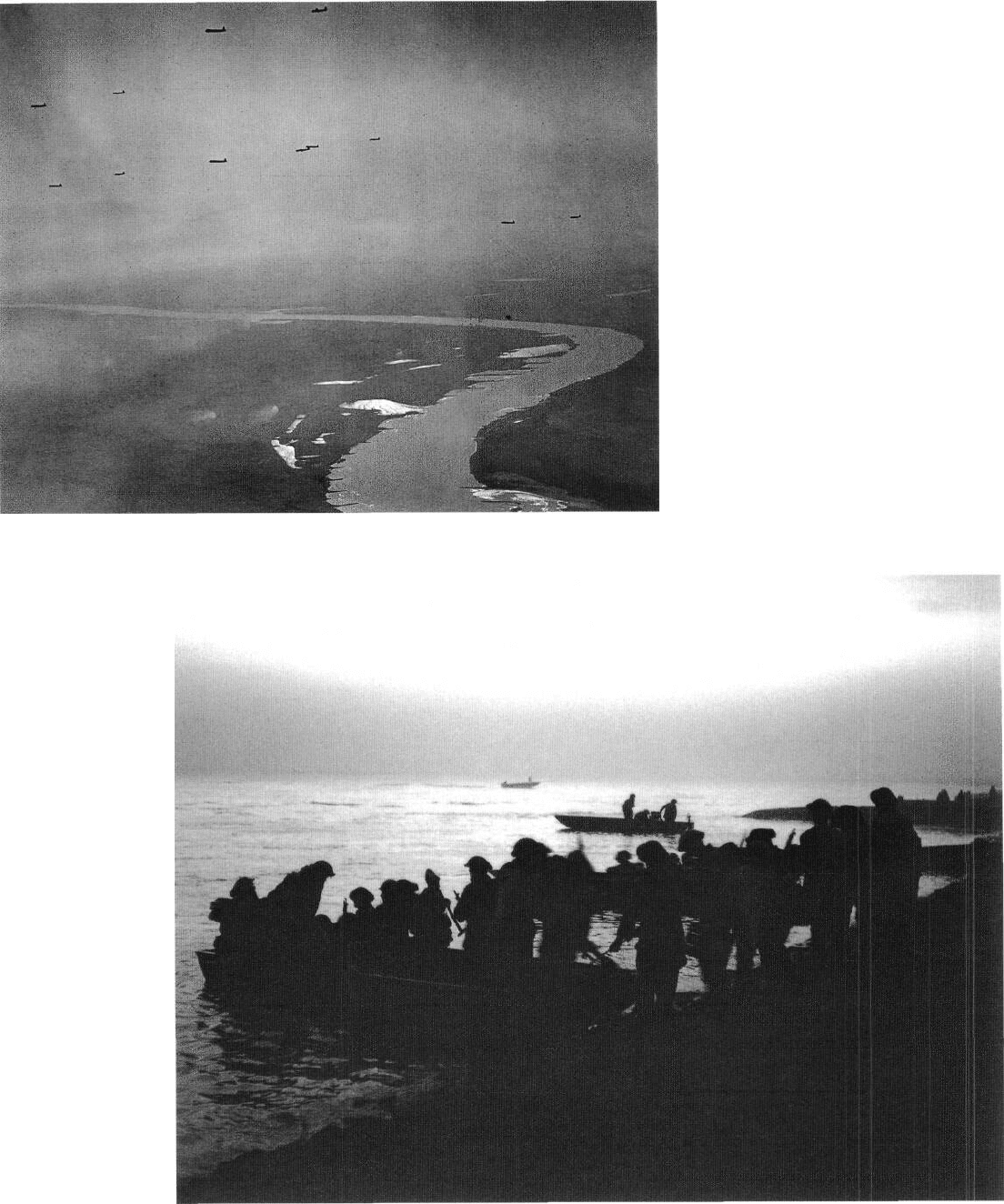
1945
Montgomery's Rhine crossing, Operation
Plunder, was covered by Operation
Varsity, the dropping of two airborne
divisions east of Wesel on the morning
of March 24. In this photograph RAF
Stirlings tow Horsa gliders over the Rhine.
BELOW
British troops crossing the Rhine.
370
LEFT
